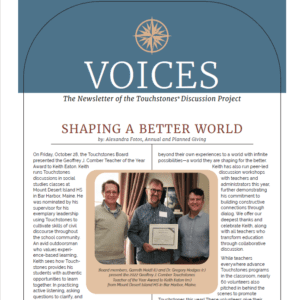By Stefanie Takacs, Executive Director
Since 2015, Touchstones staff have been running discussion programs within the school at the Maryland Correctional Institute for Women, MCI-W, which is located in Jessup, Maryland. The facility houses approximately 800 women, many of whom received continuing education in the prison school. Some are working toward their high school General Education Development certificate, GED, while others take office management classes to augment their employability when they are released.
As more women entering MCI-W already have a high school diploma or GED, the Department of Labor and Licensing, which oversees prison education in Maryland, has intensified its focus on workforce preparation. Touchstones programs are a natural fit, with our emphasis on developing every person’s ability to articulate ideas and reasoning clearly and respectfully—to all people. And speaking is only part of the equation. Active listening is essential for communication that is appropriately responsive and rooted in understanding. This winter we are incorporating weekly Touchstones discussions into the new workforce preparation program at MCI-W.
Although women re-entering society and returning to the workforce must be able to communicate effectively, self-expression and self-regulation are among some of the greatest challenges they face. Without these socio-emotional skills, their return home— never mind employment— will likely be short-lived. While incarcerated women learn and cultivate specific skills for particular types of employment in their other classes, it is only in Touchstones that the women practice vital communication and leadership tools they will use in all sorts of situations—before they leave prison and every day afterward. With these abilities, the women are more fully prepared to effect real and positive, continuous change in themselves and their families.
In their Touchstones classes the women connect prior experience to new situations and begin to recognize that they have the intellectual tools to solve problems constructively—and by working with others. Together with the Touchstones staff and their teacher, they apply cooperation, tolerance, respect, and reflective thinking to real-world situations to explore new outcomes. In the words of the school principal, Touchstones makes a real difference in these women’s lives because it teaches them to “think differently.” It’s when we begin to see the continuous positive change in themselves and their families.



 Join the
Join the